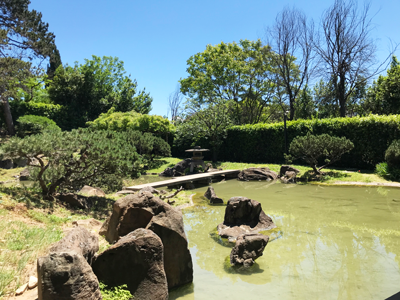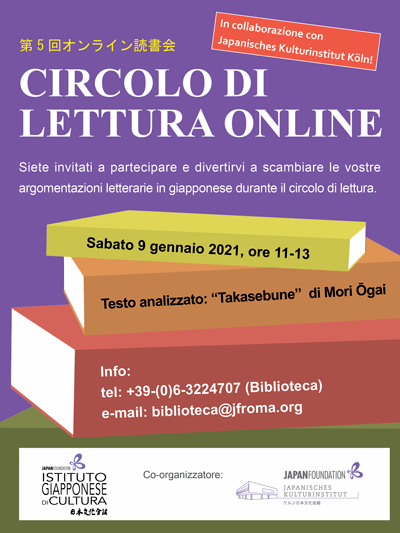2021 Japanese-Language Assistants’ Report: From Face-to-Face to Online
The Japan Cultural Institute in Rome
MIYAZAWA Akane
The Japan Cultural Institute in Rome (hereafter referred to as "the Institute") has a Japanese garden, the first of its kind in Italy. Looking out of the classroom window, you can see small ponds, bridges, and lanterns, which are elements of a garden in the style of "Sen-en." On sunny days, you can see cats strolling and families of seagulls and ducks swimming in the small pond. I would like to describe my work as a Japanese-Language Assistant (hereafter referred to as "Assistant") in a Japanese language course classroom, right next to such beautiful nature.

Japanese garden seen from the classroom of the Institute
Work as a Japanese-Language Assistant
As an Assistant, I am mainly responsible for (1) teaching Japanese language courses and (2) planning and organizing Japanese language related events. Due to the effects of COVID-19, when I arrived in October 2020, all classes and events were already online. I'd like to report on what I've learned in the process of taking the classes and events that I used to conduct face-to-face in the classrooms and library of the Institute and putting them online.
Autonomous Learning Support Course - How to Support Autonomous Learning Online
This course, taught by an Assistant, is designed for learners to study at their own pace in order to achieve the goals they have set for themselves in learning Japanese. Some of the students are university students pursuing self-study through the Japan Foundation's (JF) "Marugoto: Japanese Language and Culture" (hereafter referred to as "Marugoto") online course, while some others are lifelong learners, researching calligraphy and Japanese history, and their studies cover a wide range of topics. The course used to be held at the library of the Institute, but from October 2020, it is being offered online. Initially, we went through a trial and error process to find ways to support autonomous learning online. Listening to the wishes of the students, we decided to make the lesson time a forum for the output of daily learning, and to support the learners in their learning by setting "presentations" at the end of the semester, so that they can work towards making presentations of the theme they have chosen. Specifically, I introduced JF's online learning tools and provided weekly feedback on the content of the presentations. At the end of January 2021, three students presented their work in an "online presentation". The themes of the presentations were diverse and ranged from "Japanese comedy" to "Kojiki and Nihonshoki" and the movie "Thermae Romae," and I think these presentations really demonstrated the "decide what you want to study" nature of this course.
Some of the registrants for this course were elderly people who have continued to study Japanese as a lifelong learning experience, and some of them found it difficult to use the online tools necessary to take the course. However, even though the learning environment has changed, their motivation to learn Japanese has not changed, and I felt that the way they set their own goals and steadily proceeded with their studies was the ideal of lifelong learning. I would like to continue researching materials for online learning tools that can be used for autonomous learning and that meet a wide range of individual learning objectives.
Online Reading Group - Cologne and Rome Joint Conference
One of the events that I am in charge of with the librarian at the Institute's library is the "Online Reading Group".
The "5th Online Reading Group" in January 2020 was co-hosted with the Japan Cultural Institute in Cologne.
Since held online, this was the first time for this reading group to be held jointly with another office, as it was previously held at the library of the Institute with Japanese and Italian learners living in Rome. We spent about an hour and a half discussing Ogai Mori's "Takasebune" in small groups. It was a fruitful meeting for both offices, with a variety of opinions from the perspectives of Italians and Germans. I think one of the advantages of having everything online is that it is now easier to co-host events with offices in other countries. I would like to create opportunities for Japanese language learners around the world to interact by actively planning online events with other European offices.

The 5th Online Reading Group (co-organized with the Japan Cultural Institute in Cologne)
Future Goals - Preparing for Rapid Changes in the Learning Environment
At the same time that classes and events have gone online, many teacher training events and workshops have also gone online, which has made it easier for me to participate in training events held in other regions. I am trying to learn how Japanese classes are conducted in other countries and what online learning tools they use, so that I can immediately incorporate them into my own classes. When I first learned about "hybrid teaching" during the training, I strongly felt that we are living in an era where the learning environment is changing day by day. I am often bewildered by the speed of change, but I would like to take this as a good opportunity to get used to online tools and grow to become a teacher who can adapt to any changes in the future.
- What We Do Top
- Arts and Cultural Exchange [Culture]
- Japanese-Language Education Overseas [Language]
- Japanese-Language Education Overseas [Language] Top
- Learn Japanese-language
- Teach Japanese-language
- Take Japanese-Language Test
- Know about Japanese-language education abroad
- The Japanese-Language Institute, Urawa
- The Japanese-Language Institute, Kansai
- Japanese-Language Programs for Foreign Specified Skilled Worker Candidates
- Japanese Language Education for Japanese Children Resident Overseas and for the Descendants of Migrants
- Archives
- Japanese Studies and Global Partnerships [Dialogue]
- JF digital collection
- Other Programs / Programs to Commemorate Exchange Year
- Awards and Prizes
- Publications
